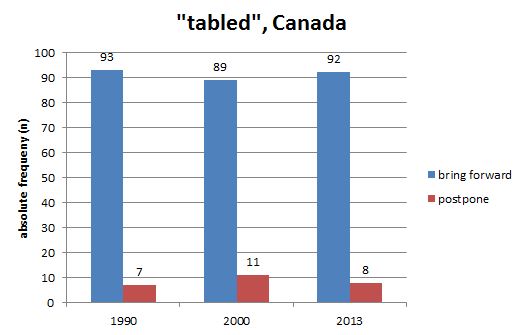DCHP-2
table DCHP-2 (July 2016)
1 v. — often Politics
bring a topic or a piece of legislation forward for discussion.
Type: 2. Preservation — To table meaning 'to bring forward for discussion' is a preservation from British English and is found in many former British colonies. OED-3 has attestations for this meaning as far back as 1653 (see OED-3, s.v. "table"(4.a)). Confusion may arise, however, because to table has the opposite meaning in the US, i.e. 'to postpone discussion of a topic'. Both uses have been found in Canada since the mid-19th century (see also meaning 2).
As the data shows (see Charts 1 and 2), at least since the 1990s the British meaning of 'bring forward' has been overwhelmingly prevalent in Canada. In three samples of 100 tokens from Canadian newspaper articles from 1990 to 2013, 93 percent of meanings for tabled were the British-origin 'bring forward', while only 7 percent had the meaning of 'postpone'. These percentages remain very stable from 1990 to 2013 (see Chart 1, fluctuation between 7 and 11 percent). In comparison, the same analysis with 100 US newspaper tokens in each period yielded the finding that 99 percent of them meant 'postpone' over the three periods, which leads us to call this meaning the "US meaning" of tabled (see Chart 2). As with other linguistic features, Canadian English is flexible enough to tolerate both, but prefers, by a great margin, the meaning 'bring forward'.2 † v. — often Politics
postpone the discussion of a topic or a piece of legislation until a later date.
Note: this meaning is not a Canadianism in the DCHP-2 typology and is thus marked by a "dagger". Examples are listed here to illustrate its long history in Canadian English.References:
Images:
Chart 1: Semantic analysis for 300 unambiguous CanE tokens of tabled (B. Ford, S. Dollinger), data: Canadian Newsstand sample, 4 Jul. 2013
Chart 2: Semantic analysis of 300 unambiguous AmE tokens (B. Ford, S. Dollinger), data: LexisNexis News sample, 4 Jul. 2013

